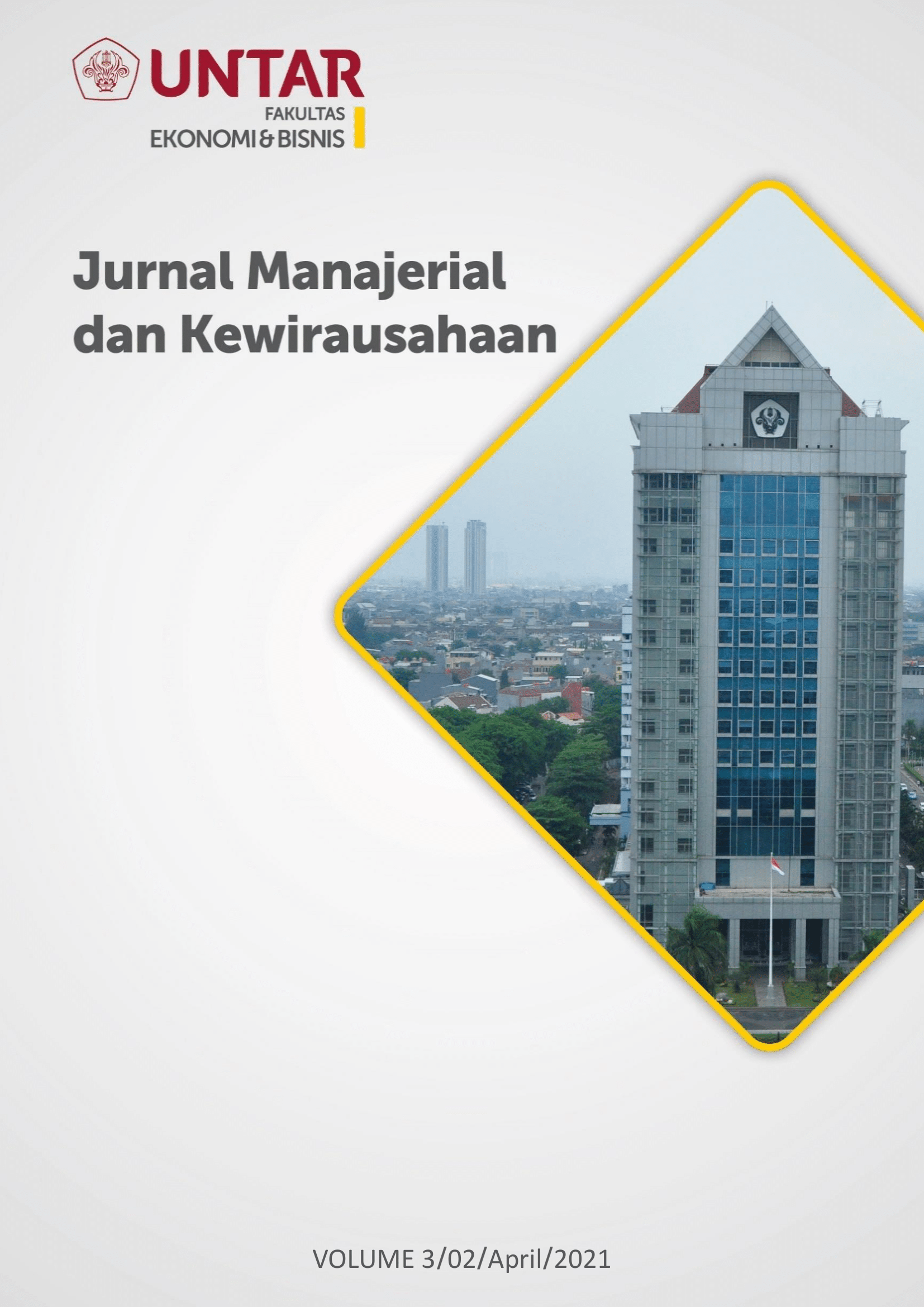Pengaruh Creativity, Proactive Personality, Dan Entrepreneurial Alertness Terhadap Intensi Berwirausaha Pada Mahasiswa
Main Article Content
Abstract
The purpose of this study was to see the influence of creativity, proactive personality, and entrepreneurship on student entrepreneurial intentions. The sampling technique is non probability sampling. The data technique uses a questionnaire with the help of google form. The number of samples used was 99 respondents. The analysis technique uses multiple regression analysis with t test and the coefficient of determination. The data analysis tool used is the assistance of the Statistics Product and Service solutions (SPSS) program. The results showed that Creativity, Proactive Personality and Entrepreneurial Awareness had a positive and significant effect on student entrepreneurial intentions.
Tujuan dari penelitian ini untuk mengetahui pengaruh Creativity, Proactive Personality, dan Entrepreneurial Alertness terhadap intensi berwirausah pada mahasiswa. Teknik pengambilan sampel yaitu non probability sampling. Teknik pengumpulan data menggunakan kuisioner dengan bantuan google form. Jumlah sampel yang digunakan adalah 99 responden. Teknik analisis ini menggunakan analisis regresi berganda dengan uji t dan koefisien determinasi. Alat analisis data yang digunakan adalah dengan bantuan program Statistical Product and Service solutions (SPSS). Hasil penelitian menunjukan bahwa Creativity, Proactive Personality dan Entrepreneurial Alertness berpengaruh positif dan signifikan terhadap intensi berwirausaha pada mahasiswa.
Article Details
Section
This work is licensed under a Jurnal Muara Ilmu Ekonomi dan Bisnis Creative Commons Attribution-ShareAlike 4.0 International License.,/p>
References
Aurilia Triani Aryaningtyas. (2018). Dukungan Akademik: Moderasi hubungan Kepribadian Proaktif terhadap niat kewirausahaan mahasiswa. Media Ekonomi dan Manajemen, Vol. 33, No. 2, Juli 2018, 175-186.
Baldacchino. (2008). Entrepreneurial Creativity and Innovation. The First International Conference on Strategic Innovation and Future Creation. University of Malta, Malta.
Covey, Steven R. (2010). The 7 Habits of Highly Effective People (7 Kebiasaan Manusia yang Sangat Efektif). Tangerang: Binarupa Aksara Publisher.
Crant, J. M. (2000). Proactive Behavior in Organizations. Journal of Management, 26(3), 435-462.
Delle Eric dan Amadu Ibrahim Monipaak. (2015), Proactive Personality and Entrepreneurial Intention: Employment Status and Student Level As Moderators. International Journal of Small Business and Entrepreneurship Research, Vol. 3, No. 4, pp.1-13, July 2015.
Dufays, F. (2014). Creativity and entrepreneurship: changing currents in education and public-life. International Journal of Entrepreneurial Behavior & Research, Vol. 20, No. 3, pp. 197-199.
Fatmawati, I. (2013). Pengaruh Kreativitas Berwirausaha dan Prestasi Belajar Kewirausahaan Terhadap Motivasi Berwirausaha Pada Mahasiswa Program Studi Pendidikan Akuntansi Fakultas Keguruan dan Ilmu Pendidikan Universitas Muhammadiyah Surakarta Angkatan 2010/2011.
Hapsah Riqki dan Savira Siti Ina. (2015). Hubungan Antara Self Efficacy dan Kreativitas dengan Minat Berwirausaha. Jurnal Psikologi Teori dan Terapan, 5(2), 80. DOI: 10.26740/jptt.v5n2.p80-89
Hu, Wang, Zhang dan Bin. (2018). Creativity, Proactive Personality, and Entrepreneurial Intention: The Role of Entrepreneurial Alertness. Front. Psychol., Vol 9.
Kaufman, J. (2016). The creative construct. RSA: 21st Century Enlightenment, No. 1, pp. 24-27.
Lee, S.H. & Wong, P.K. (2004). An Exploratory Study of Technopreneurial Intentions: A Career Anchor Perspective. Journal of Business Venturing, 19(1), 7-28.
Lim, Yusof and Nor. (2017). The impact of Entrepreneurial Alertness on Entrepreneurial Intention among University Student in Malaysia: Theory of Planned Behaviour”. Journal of Engineering and Applied Sciense, 12(6), 1409-1418, Medwell Journal.
Munandar, Utami. (2009). Pengembangan kreativitas anak berbakat. Jakarta: Rineka cipta.
Mustafa, M. J., Hernandez, E., Mahon, C. and Chee, L. K. (2016). Entrepreneurial intentions of university students in an emerging economy: the influence of university support and proactive personality on students’ entrepreneurial intention. Journal of Entrepreneurship in Emerging Economies, Vol. 8, No. 2, pp. 162-179.
Notoatmodjo, Soekidjo. (2003). Pengembangan Sumber Daya Manusia. Jakarta: PT. Rineka Cipta.
Phipps, Simone T.A dan College Macon Stage. (2012). Contributor To An Enterprising Gender: Examining The Influence of Creativity on Entrepreneurial Intentions and The Moderating Role of Political Skill Controlling For Gender. Academy of Entrepreneurship Journal, Vol. 18, No. 1.
Rodhiah et al. (2021) Appliation of the Analyti Hiereahy Proess Method in determining a reative Industry Strategy: Evidence From reative Industry in South Tangerang. PJAE 18 (2021).
Santrock, J. W. (2014). Psikologi Pendidikan Edisi 5 Jilid 1. Jakarta: Salemba Humanika.
Suryana. (2013). Kewirausahaan Kiat dan Proses Menuju Sukses, Edisi 4, Jakarta: Salemba Empat.
Tang, J., Kacmar, M. and Busenitz, L. (2012). Alertness in the pursuit of new opportunities. Journal of Business Venturing, Vol. 27, No. 1, pp. 77-94.
Tung, Lo Choi. (2011). The Impact of Entrepreneurship Education on Entrepreneurial Intention of Engineering Students. City University of Hongkong: Run Run Show Library.
Valliere. (2013). Entrepreneurial Alertness and Paying Attention. Journal of Enterprising Culture, 21(01).
Wijaya, Tony. (2007). Kajian Model Empiris Berwirausaha UKM DIY dan Jawa Tengah. Jurnal Manajemen dan Kewirausahaan.
Zimmerer, T. W., dan N. W. Scarborough. (2008). Kewirausahaan dan Manajemen Usaha Kecil. 5 ed. Jakarta: Salemba Empat.

